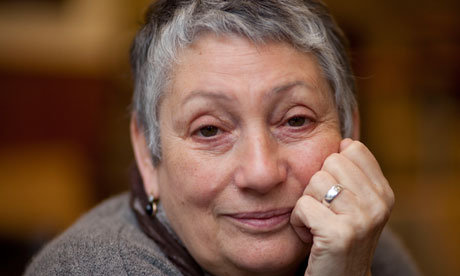Observer: Lyudmila Ulitskaya: Why I’m not afraid of Vladimir Putin
 Lyudmila Ulitskaya has shown she is not afraid to take on the Kremlin over jailed oligarch Mikhail Khodorkovsky or the right to freedom of expression
Lyudmila Ulitskaya has shown she is not afraid to take on the Kremlin over jailed oligarch Mikhail Khodorkovsky or the right to freedom of expression
Lyudmila Ulitskaya does not like to draw attention to herself. In person, she is unassuming and softly spoken, a 68-year-old grandmother with grey cropped hair and small, elegant hands. She does not consider herself exceptional. “I am one of those people who just enjoys living,” she says, shrugging her shoulders lightly as she takes her seat in the lobby of a draughty London hotel.
But this modest, self-effacing individual is one of Russia’s foremost contemporary novelists and a leading advocate for freedom of expression. She started writing almost by accident after she was sacked from her job as a geneticist in the 1960s and accused of dissident activity by the former Soviet authorities. “I thought, quite wrongly, that scientists were freer [than artists],” she has written in the past. “Of course, all these illusions were shattered over time.”
Her books and short stories have been translated into several languages – she is currently in the UK to promote the English language version of her novel Daniel Stein, Interpreter, which comes out in July. She was the first woman to win the Russian equivalent of the Booker prize and, more recently, has attracted both controversy and acclaim for publishing her correspondence with the jailed billionaire Mikhail Khodorkovsky. This week, she will be talking at the Foreign Policy Centre in London about personal and political freedom in Russia, examining what it is to be an artist in a state run by Vladimir Putin, a man not known for his tolerance of free speech or respect for human rights.
“I’m not afraid,” Ulitskaya insists, speaking through a translator. “Compared to the Stalinist era, our government now is a pussycat with soft paws … Having said that, I believe that Khodorkovsky is in jail because the whole society was so scared that no one stood up for his defence. There were threats: the court was afraid, the witnesses, the judge, because no one had the courage to speak up and that saddens me. That loss of dignity frustrates me because our society had only just started overcoming its fear after so many years of oppressive rule. The Russian people have once again started to be gripped by fear.”
Khodorkovsky, the former head of oil giant Yukos and once Russia’s richest man, was jailed for eight years in 2005 along with his business partner after being found guilty of embezzling more than £16.3bn worth of oil from his own company and laundering the proceeds. Khodorkovsky’s lawyers maintain that the charges are absurd and based on a failure to understand normal business practices. Their client, they argue, is a political prisoner and a symbol of a corrupt Russian judicial system – a view supported by Ulitskaya. “I’m absolutely convinced that all of the allegations were absurd,” she says. “It started from tax evasion, then got blown out of proportion. The next allegation was theft, which is completely absurd because you can’t steal from yourself.”
In December, the former businessman was convicted on new fraud charges, a move widely condemned in the west as politically motivated revenge for Khodorkovsky’s defiance of the Kremlin – in the past, the oligarch made no secret of his support for Putin’s liberal opponents. He now faces imprisonment until 2014.
Ulitskaya began writing to the imprisoned oligarch in 2008, addressing her letters to him in the Soviet-era labour camp in eastern Siberia where he was incarcerated. The correspondence lasted for a little under a year and their letters covered everything from personal backgrounds to political motivations. At first, Ulitskaya did not expect to find they had much in common. The child of two scientists, she had grown up in Moscow with an innate mistrust for authority after both her grandfathers were imprisoned by Stalin’s regime. By contrast, Khodorkovsky’s parents worked in a Soviet-era factory and, as a boy, he was a faithful member of the Komsomol, the youth wing of the Communist party. As an adult, he rose to become one of Boris Yeltsin’s most trusted advisers. But gradually, she learned to respect him.
“I was travelling round Russia a lot and I would constantly come across different traces of his charitable work,” Ulitskaya says. “He spent a lot of money on education, setting up children’s homes, giving schools the latest computer equipment. My support for Khodorkovsky primarily lies in how much money he spent on charitable enterprises.



